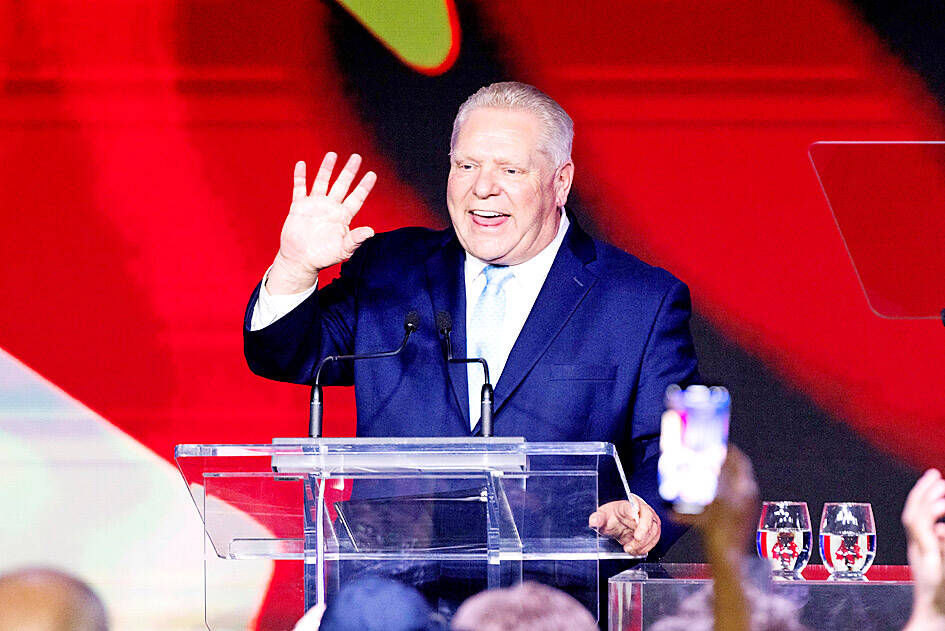Ontario Premier Doug Ford won re-election to lead Canada’s most populous province on Thursday, giving him the mandate he wanted to fight tariffs threatened by US President Donald Trump.
“Donald Trump thinks he can break us,” Ford told a cheering crowd at a Toronto convention center. “He thinks he can divide and conquer, pit region against region. Donald Trump doesn’t know what we know.”
“Let me be clear. Canada will never, ever be the 51st state. Canada is not for sale,” he said.

Photo: Reuters
Unofficial results from Elections Ontario showed Ford’s Progressive Conservative Party would win a majority, giving him his third term as premier.
Canadian Prime Minister Justin Trudeau, whose Liberal Party would choose a new leader on March 9, congratulated Ford on his victory.
“At this crucial time, we must work together to defend Canadian interests, protect workers and businesses, and grow our economy,” Trudeau said in a statement.
Ford called the election on Jan. 29, more than a year early. The Conservatives already held a majority with 79 seats.
At the time, Ford said he needed a four-year mandate to protect Ontario, Canada’s manufacturing and automobile hub.
Trump has threatened to implement 25 percent tariffs on all Canadian imports, with a lower 10 percent levy on energy, beginning on Tuesday. He has also angered Canadians by talking about Canada becoming the 51st US state.
During his speech, Ford said during his time as premier he has shown he would work with anyone to achieve results.
“As we stare down the threat of Donald Trump’s tariffs, I will continue to do just that,” he said.
Jonathan Malloy, a political scientist at Carleton University in Ottawa, said the tariff threats gave Ford the excuse he needed to call an early election.
“Canadians are concerned with the Trump tariffs,” Malloy said. “Mr. Ford is being seen as being out front, responding to them. That’s politically advantageous for him.”

Kehinde Sanni spends his days smoothing out dents and repainting scratched bumpers in a modest autobody shop in Lagos. He has never left Nigeria, yet he speaks glowingly of Burkina Faso military leader Ibrahim Traore. “Nigeria needs someone like Ibrahim Traore of Burkina Faso. He is doing well for his country,” Sanni said. His admiration is shaped by a steady stream of viral videos, memes and social media posts — many misleading or outright false — portraying Traore as a fearless reformer who defied Western powers and reclaimed his country’s dignity. The Burkinabe strongman swept into power following a coup in September 2022

‘FRAGMENTING’: British politics have for a long time been dominated by the Labor Party and the Tories, but polls suggest that Reform now poses a significant challenge Hard-right upstarts Reform UK snatched a parliamentary seat from British Prime Minister Keir Starmer’s Labor Party yesterday in local elections that dealt a blow to the UK’s two establishment parties. Reform, led by anti-immigrant firebrand Nigel Farage, won the by-election in Runcorn and Helsby in northwest England by just six votes, as it picked up gains in other localities, including one mayoralty. The group’s strong showing continues momentum it built up at last year’s general election and appears to confirm a trend that the UK is entering an era of multi-party politics. “For the movement, for the party it’s a very, very big

ENTERTAINMENT: Rio officials have a history of organizing massive concerts on Copacabana Beach, with Madonna’s show drawing about 1.6 million fans last year Lady Gaga on Saturday night gave a free concert in front of 2 million fans who poured onto Copacabana Beach in Rio de Janeiro for the biggest show of her career. “Tonight, we’re making history... Thank you for making history with me,” Lady Gaga told a screaming crowd. The Mother Monster, as she is known, started the show at about 10:10pm local time with her 2011 song Bloody Mary. Cries of joy rose from the tightly packed fans who sang and danced shoulder-to-shoulder on the vast stretch of sand. Concert organizers said 2.1 million people attended the show. Lady Gaga

SUPPORT: The Australian prime minister promised to back Kyiv against Russia’s invasion, saying: ‘That’s my government’s position. It was yesterday. It still is’ Left-leaning Australian Prime Minister Anthony Albanese yesterday basked in his landslide election win, promising a “disciplined, orderly” government to confront cost-of-living pain and tariff turmoil. People clapped as the 62-year-old and his fiancee, Jodie Haydon, who visited his old inner Sydney haunt, Cafe Italia, surrounded by a crowd of jostling photographers and journalists. Albanese’s Labor Party is on course to win at least 83 seats in the 150-member parliament, partial results showed. Opposition leader Peter Dutton’s conservative Liberal-National coalition had just 38 seats, and other parties 12. Another 17 seats were still in doubt. “We will be a disciplined, orderly